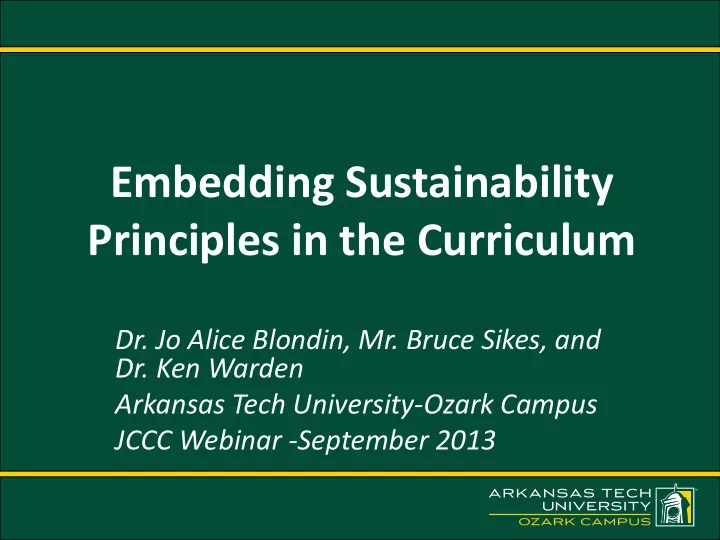

Embedding Sustainability Principles in the Curriculum Dr. Jo Alice Blondin, Mr. Bruce Sikes, and Dr. Ken Warden Arkansas Tech University-Ozark Campus JCCC Webinar -September 2013
Background and Mission – ATU-Ozark • Sole two-year campus of a four year university • Located in rural western Arkansas • Serves 7 counties • Approximately 2000 students – Mission • Arkansas Tech University - Ozark Campus, in partnership with the community, will provide a quality educational environment which will enable all students to learn the skills and acquire the knowledge necessary for them to become contributing members in the workforce and in society.
Making the Case For Sustainability in Higher Education • We must: – Change the way people behave in order to positively impact our environment. – Recognize that institutions of higher education have an impact on how society responds to a changing world – Provide leadership and educate individuals on their impact to the environment and how they can help. – Realize that past efforts have been isolated or episodic – Do the right thing
Notable Efforts in Two-year Schools • Butte College in Oroville, CA – Grid Positive • Portland Community College in Portland, OR – Climate Action Plan 2009 – Greenhouse gas emission reduction plan – Programs of study • Central Piedmont College Charlotte, NC – Sustainability focused programs – Center for Sustainability
What About the Rest of Us? • How does a resource-challenged smaller two- year school positively impact its community? • Typical methods: • Recycle • E-waste drives • Carpool programs • Energy management on campus • Water management on campus • These initiatives are great, but…how can we do more to change the culture of our students, institution, community, and region?
Sustainability in Arkansas • Arkansas Ranks 9 th in LEED Certified Projects per capita • In 2010 Arkansas reduced more Green House Gas emissions than any other state • Heifer International and the Clinton Foundation (both Arkansas firms) have implemented international sustainability projects • Arkansas 10% renewable electric portfolio (21 st nationally) • Arkansas Energy Sector Partnership (AESP)
Board Leadership and Insight • It all starts with our Board of Trustees • Tech’s Board of Trustees leads the campuses through their approval of policies that enhance the student experience: – Facility improvements and efficiencies – Program and curricular changes – Strategic and Master planning for both campuses
We Know We Can Do More With Less: ATU-Ozark’s Approach: The Green Transcript • Embed green practices in existing programs • Focus: Employability of Graduates • Making jobs “green” rather than making green jobs • 12 credit hours of “green”-intensive courses
A “Green” Campus Overview • Fits our Mission • Reflects economic development expectations in community • Leads students and stakeholder in “doing what’s right” • Offers “value-added” for graduates now, but over time it will be an expectation
Campus Initiatives • Strategic Planning • AESP (Arkansas Energy Sector Partnership) • Energy Corps Volunteer • Keep Arkansas (KAB) and Ozark (KOB)Beautiful • Waste Management and Sustainability • ESCO E-waste Partnership • Campus Quality of Life: Recycling, Environmental Education, and Ozark Area Improvements in Outdoor Facilities
Campus Goals Students completing a TC or AAS program of study will be able to: Identify, analyze and solve technical problems. Communicate effectively. Engage in life long learning. Understand professional, ethical and social responsibilities. Commit to quality, timeliness and continuous improvement. Utilize and apply critical thinking skills. Contribute and function in a collaborative environment. Apply knowledge and skills required to function in a specific technical discipline. Recognize and apply knowledge of environmentally-friendly resources and utilize them effectively and efficiently in workplace.
Catalog Statement Upon graduation, students may earn a “Green” designation on their transcript by completing no less than 12 hours of coursework directly supporting their ability to apply environmental awareness and responsibility to their personal and professional daily life. Such coursework may include waste and energy management, environmental health, alternative technology, environmental law and regulation, general environmental awareness and advocacy topics. Courses supporting a Green Transcript are identified in the Ozark Campus catalogue.
Action Plan for Green Transcript Identify and list “Green” courses Note course meeting “Green” requirement in Program. Develop Audit Sheets by noting Green compliance Identify the definition of “Green” Certification Add description to Catalog Note Green in each individual course description that meets the “Green” requirement, add to the catalog Audit degrees to meet “Green” certification requirements Identify “Green” Certification on transcript
• Program Audit Form
Assessment Green course objectives clearly stated on course syllabus Measurable outcomes defined using direct and/or indirect tools Program chairs maintain “Green” data Outcomes included in program assessment Program chairs monitor data thresholds to determine actions: Instructional and/or curricular Design Budget appropriate instructional aids Professional development Campus policies
Challenges • Communication with Stakeholders – Internal Marketing • Advising Students • Industry Recognition of Transcript • Assessment • Replication
Successes • Awarded 91 Green Transcripts during May 2013 Commencement • 1644 SSCH taken during 2012-13 • Presentations at NISOD and NCWE • Press – http://www.thecitywire.com/node/25406 • Industry Feedback
Thank you! www.atu.edu/ozark
Recommend
More recommend